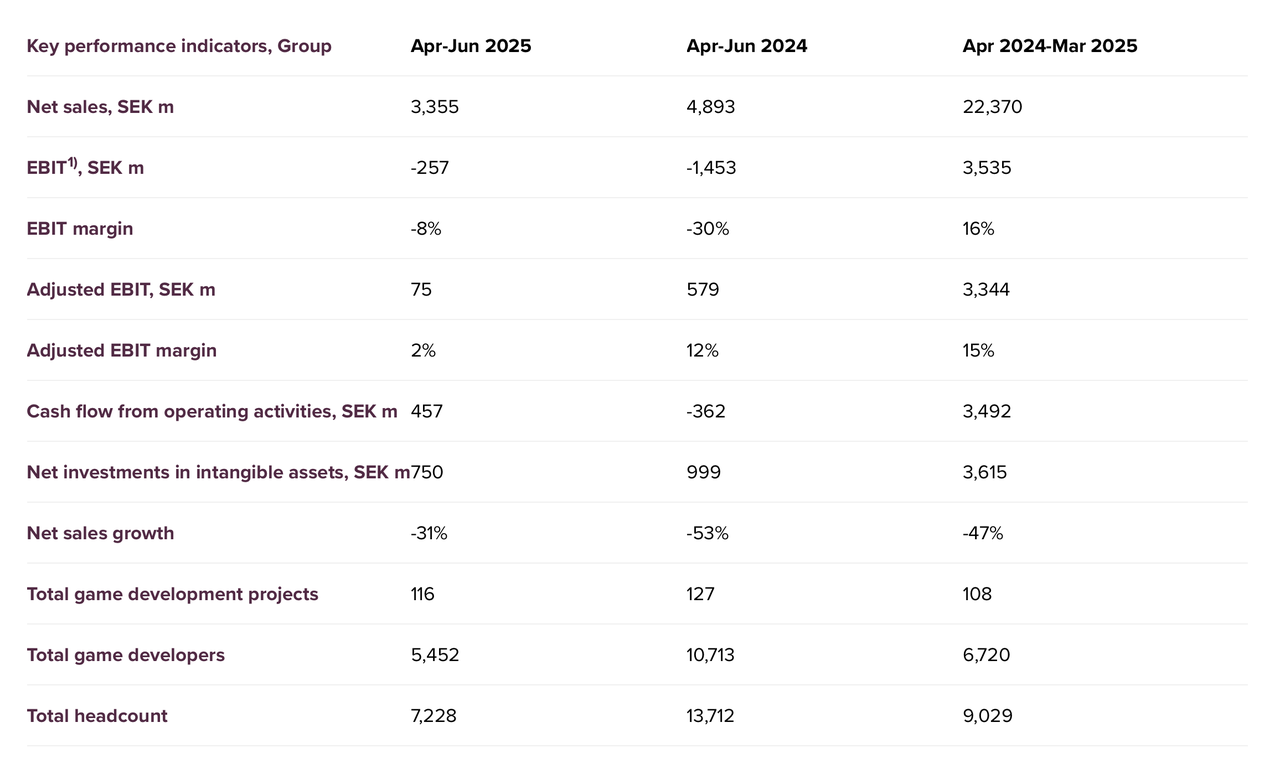Embracer Group—which is in the process of splitting into three standalone companies following an era of mass layoffs, project cancellations, and divestments—has confirmed it will explore “targeted cost initiatives” and look to streamline processes with the help of AI technology during what CEO Phil Rogers described as a “transition year” for the Swedish conglomerate.
Addressing investors in the company’s latest fiscal report, Rogers said Embracer’s performance during the first quarter of the current financial year was “quiet” and said the company must now focus on “operational and strategic execution” to position itself for long-term growth.
Consolidated net sales decreased by 31 percent to SEK 3,355 million ($350.5 million) during Q1. Breaking that total down by operating segment, PC/Console Games decreased by 38 percent to SEK 1,641 million; Mobile Games decreased by 63 percent to SEK 520 million; and Entertainment & Services increased by 41 percent to SEK 1,193 million.
“As we move forward, we are taking a conservative approach for this current year, reflecting a measured view on the timing and performance of our PC/Console release schedule in addition to potential continued softness in our catalog following Q1,” said Rogers, who officially stepped up as CEO on August 1, 2025, to allow outgoing chief exec Lars Wingefors to take on the mantle of executive chair.
“This year is a transition period as we lay the foundations of Fellowship Entertainment and focus on building a business led by key IP and empowered teams, in a structure enabling focus and operational discipline. It is paramount that we concentrate on the quality and long-term value of our releases rather than chasing short-term gains.”
What does that mean for Embracer employees? According to Rogers, the company will implement “targeted cost initiatives” relating to underperforming business. Those initiatives could potentially result in more divestments. Game Developer has reached out to Embracer to clarify whether those plans could potentially include layoffs.
Embracer CEO believes AI will become an “increasingly supportive force”
Rogers claims Embracer is facing a “pivotal moment” and must double down on its biggest franchises. He explained the company has increased capital allocation to its core IPs, which include The Lord of the Rings, Tomb Raider, Kingdom Come Deliverance, Metro, Dead Island, Darksiders, and Remnant.
He believes those franchises represent “one of the most exciting IP portfolios in the industry” but said Embracer must now “sharpen” its focus. The company currently has nine triple-A titles slated for release, excluding projects being financed by external partners.
“As previously noted, one or a couple of these games will most likely slip into FY 2028/29, but we do see a clear increase in release cadence as compared to our average of just over 1 AAA game per year in the past five years,” said Rogers, discussing that release slate. “We expect the increased released pipeline in combination with lower fixed costs will notably improve free cashflow FY 2026/27 onwards.”
As Embracer prepares to evolve into Fellowship Entertainment, Rogers said the company must significantly rewire its business to create a “powerhouse unit” within its PC and console division. According to Rogers, leveraging AI technologies will be integral part of that process. His predecessor had already suggested that ignoring AI tools could lead to it being “outrun” by its competitors.
“This comes through smarter collaboration, increased streamlining, shared services and with AI as an increasingly supportive force,” Rogers continued. “These factors will be key to unlocking value and expanding margins.”
As the table below shows, Embracer has already significantly reduced its workforce following a number of layoffs and key divestments.
Its entire workforce totalled 7,228 people (including 5,452 game developers) as of June 2025. That a notable decrease on the 13,712 workers (and 10,713 game developers) it employed at the end of June 2024.
The company currently has 116 video games in development—down on the 127 projects it had in the pipeline this time last year, but actually up on the 108 titles it showcased in March.




